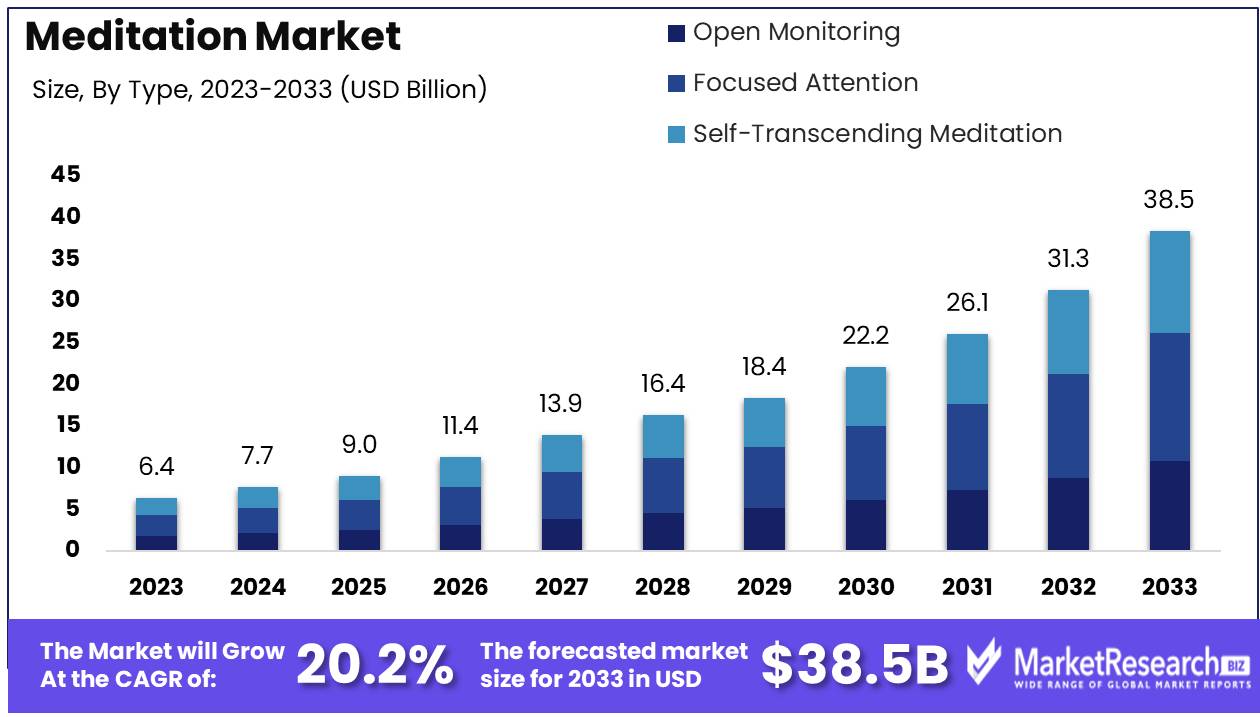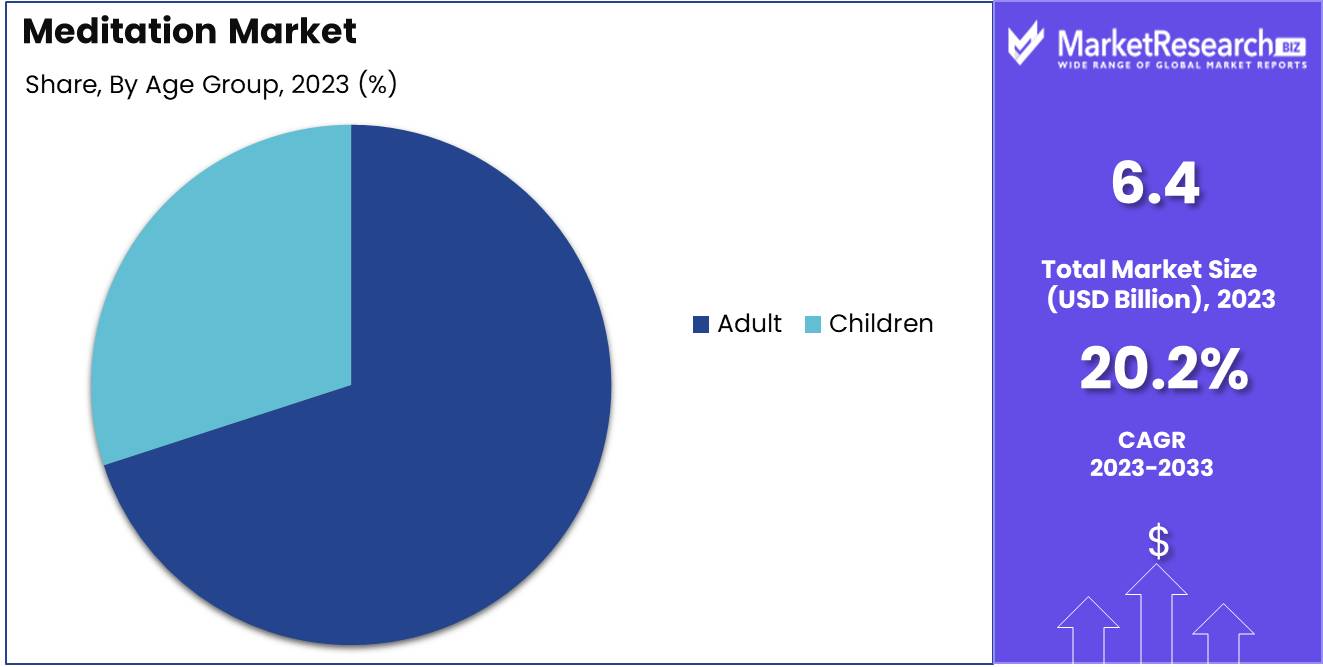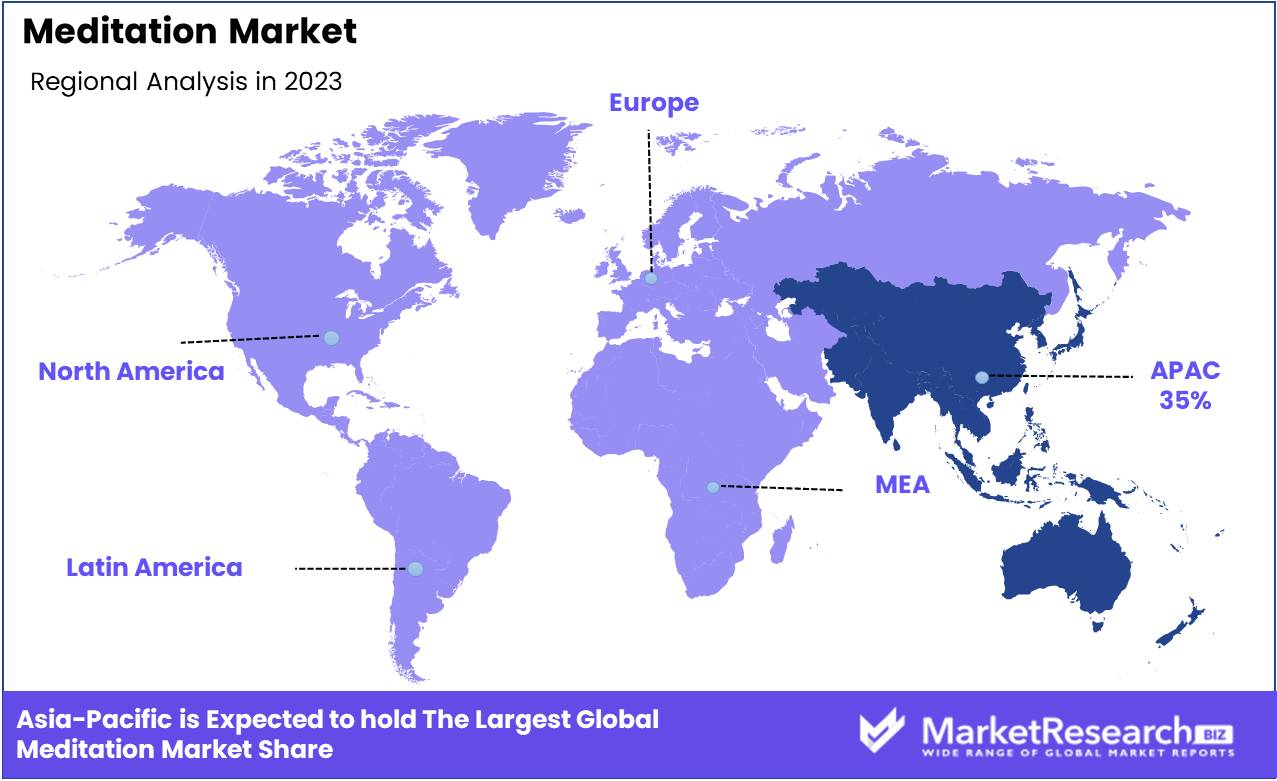
Meditation Market By Type (Open Monitoring, Focused Attention, Self-Transcending Meditation), By Meditation Type (Progressive Relaxation/Body Scan Meditation, Mindfulness Meditation, Breath Awareness Meditation, Spiritual Meditation/ Transcendental Meditation, Zen Meditation, Kundalini Yoga, Metta Meditation), By End Use (Home Setting, Meditation Centers, Corporates/Schools/Colleges), By Age Group (Adult, Children), By Region and Companies - Industry Segment Outlook, Market Assessment, Competition Scenario, Trends and Forecast 2024-2033
-
37536
-
Feb 2025
-
184
-
-
This report was compiled by Trishita Deb Trishita Deb is an experienced market research and consulting professional with over 7 years of expertise across healthcare, consumer goods, and materials, contributing to over 400 healthcare-related reports. Correspondence Team Lead- Healthcare Linkedin | Detailed Market research Methodology Our methodology involves a mix of primary research, including interviews with leading mental health experts, and secondary research from reputable medical journals and databases. View Detailed Methodology Page
-
Quick Navigation
Report Overview
The Global Meditation Market was valued at USD 6.4 Bn in 2023. It is expected to reach USD 38.5 Bn by 2033, with a CAGR of 20.2% during the forecast period from 2024 to 2033.
The Meditation Market encompasses products, services, and digital platforms designed to facilitate mindfulness and meditation practices. This market includes mobile apps, guided meditation sessions, wellness retreats, and meditation accessories. Driven by increasing awareness of mental health and wellness, the market caters to individuals seeking stress reduction, relaxation, and overall well-being. The proliferation of digital platforms offering accessible and cost-effective meditation resources has significantly contributed to market growth, making mindfulness practices more mainstream and widely adopted.

The Meditation Market is experiencing robust growth, propelled by a heightened global awareness of mental health and the benefits of mindfulness practices. Platforms such as Insight Timer, which offers over 150,000 free meditations, illustrate the value-driven appeal of this market, providing comprehensive resources that cater to a wide audience. This accessibility and affordability are key factors driving user engagement and market expansion.
A U.S. survey underscores the motivations behind this trend, with 73% of mindfulness meditation practitioners meditating for general wellness and disease prevention, and 92% citing relaxation or stress reduction as their primary motivation. These statistics highlight the broad appeal of meditation as a tool for enhancing overall well-being and managing stress.
The market is also benefiting from technological advancements and the increasing integration of meditation practices into daily routines. Mobile medical apps and online platforms offer convenient, on-demand access to guided meditations, making it easier for individuals to incorporate mindfulness into their busy lives. The rise of wellness retreats and the availability of various meditation accessories further support the market's growth by catering to diverse consumer needs and preferences.
The meditation market is characterized by its rapid growth and widespread adoption, driven by the increasing recognition of the mental and physical health benefits of mindfulness practices. The proliferation of digital platforms, combined with the growing consumer focus on wellness and stress management, ensures a positive outlook for this market. Companies that continue to innovate and offer accessible, value-driven meditation resources are well-positioned to capitalize on the expanding demand for mindfulness solutions.
Key Takeaways
- Market Value: The Global Meditation Market was valued at USD 6.4 Bn in 2023. It is expected to reach USD 38.5 Bn by 2033, with a CAGR of 20.2% during the forecast period from 2024 to 2033.
- By Type: Focused Attention represents 40% of the market, essential for improving concentration and mental clarity.
- By Meditation Type: Mindfulness Meditation constitutes 30%, popular for stress reduction and mental well-being.
- By End Use: Home Setting is the primary use, making up 50% of the market, reflecting the convenience and accessibility of practicing meditation at home.
- By Age Group: Adults dominate, comprising 75% of the market, indicating a high engagement level among the adult population.
- Regional Dominance: Asia-Pacific holds a 35% market share, driven by high awareness and adoption of wellness practices.
- Growth Opportunity: Developing guided meditation apps and online resources can attract new users and promote regular practice, enhancing market growth.
Driving factors
Increasing Awareness of Mental Health and Well-Being
The growing awareness of mental health and well-being is a primary driving factor in the expansion of the meditation market. In recent years, mental health issues have gained significant attention globally, prompting individuals and organizations to seek effective methods for improving mental health. Meditation, with its proven benefits for reducing anxiety, depression, and overall psychological distress, has emerged as a preferred practice.
The increasing advocacy and campaigns by mental health organizations, combined with widespread media coverage, have educated the public on the importance of mental health, leading to a surge in the adoption of meditation practices.
Growing Adoption of Mindfulness Practices in Workplaces
The integration of mindfulness practices in workplace settings is another crucial factor contributing to the growth of the meditation market. Companies are increasingly recognizing the benefits of mindfulness and meditation in enhancing employee productivity, reducing burnout, and improving overall workplace morale. As a result, many organizations are incorporating meditation sessions and mindfulness training programs as part of their wellness initiatives.
This trend is particularly prominent in high-stress industries where employee well-being directly impacts performance and business outcomes. The corporate sector's investment in meditation and mindfulness programs is driving the demand for related products and services, further propelling market growth.
Rising Prevalence of Stress-Related Disorders
The rising prevalence of stress-related disorders, including anxiety, depression, and chronic stress, is significantly boosting the meditation market. Modern lifestyles characterized by high work pressures, financial uncertainties, and fast-paced living have led to an increase in stress levels among individuals. Meditation is widely recognized for its efficacy in managing stress and enhancing emotional resilience.
Health professionals are increasingly recommending meditation as a complementary therapy for stress-related conditions. This, coupled with the availability of numerous meditation apps and online platforms, has made meditation more accessible to the masses, thereby fueling market expansion.
Restraining Factors
Limited Scientific Validation for Some Meditation Practices
One of the restraining factors impacting the growth of the meditation market is the limited scientific validation for certain meditation practices. While many forms of meditation are backed by robust scientific research, others lack sufficient empirical evidence to support their efficacy. This inconsistency in validation can lead to skepticism among potential users, healthcare professionals, and insurance providers, hindering widespread adoption.
The absence of standardized protocols and the diversity of meditation techniques also contribute to the challenge of obtaining uniform scientific validation, thereby affecting market growth.
High Competition from Traditional Wellness Methods
The meditation market faces significant competition from traditional wellness methods, which can restrain its growth. Practices such as yoga, tai chi, and other holistic health approaches have long-established credibility and a dedicated following. These methods often offer similar mental and physical health benefits, making it challenging for meditation to stand out as a unique or superior option.
Cultural and regional preferences for traditional wellness practices can limit the penetration of meditation, especially in markets where alternative methods are deeply ingrained in the lifestyle of the population.
By Type Analysis
Focused Attention held a dominant market position in the By Type segment of the Meditation Market, capturing 40% share.
In 2023, Focused Attention held a dominant market position in the By Type segment of the Meditation Market, capturing 40% share. This form of meditation, which involves concentrating on a single object, thought, or sensation, is widely practiced for its ability to improve concentration, reduce stress, and enhance mental clarity. The popularity of focused attention meditation is driven by its simplicity and effectiveness, making it accessible to a broad range of practitioners.
Open Monitoring meditation, which involves non-reactive monitoring of the content of experience from moment to moment, also holds a significant share of the market. This type of meditation is known for promoting a deep awareness of the present moment and is often practiced by those seeking to enhance their mindfulness and emotional regulation skills.
Self-Transcending Meditation, which includes techniques like Transcendental Meditation (TM) that aim to transcend ordinary thought processes, also contributes to the market. While its share is smaller compared to focused attention, self-transcending meditation is popular among those seeking profound relaxation and stress relief.
By Meditation Type Analysis
Mindfulness Meditation held a dominant market position in the By Meditation Type segment of the Meditation Market, capturing 30% share.
In 2023, Mindfulness Meditation held a dominant market position in the By Meditation Type segment of the Meditation Market, capturing 30% share. This type of meditation, which emphasizes the awareness of the present moment, is highly popular for its proven benefits in reducing stress, anxiety, and depression. Mindfulness meditation is widely practiced in various settings, from personal routines to therapeutic interventions, and is supported by extensive scientific research highlighting its mental and physical health benefits.
Progressive Relaxation/Body Scan Meditation is also a significant practice, focusing on relaxing the body and reducing physical tension. This type of meditation is often used for stress relief and improving sleep quality, although it holds a smaller market share compared to mindfulness meditation.
Breath Awareness Meditation involves focusing on the breath and is known for its simplicity and effectiveness in calming the mind. It is commonly practiced by those seeking to improve their breathing techniques and overall mindfulness.
Spiritual Meditation/Transcendental Meditation (TM) aims to connect with deeper spiritual aspects and transcend ordinary consciousness. While popular, especially within specific cultural and spiritual contexts, its market share is less dominant compared to mindfulness meditation.
Zen Meditation (Zazen), Kundalini Yoga, and Metta Meditation are other notable types, each offering unique benefits and catering to different preferences and goals within the meditation community. These types collectively hold a smaller market share but are important for their specific contributions to the overall meditation market.
By End Use Analysis
Home Setting held a dominant market position in the By End Use segment of the Meditation Market, capturing 50% share.
In 2023, Home Setting held a dominant market position in the By End Use segment of the Meditation Market, capturing 50% share. The convenience and comfort of practicing meditation at home have led to its widespread adoption, especially with the availability of online classes, apps, and virtual meditation sessions. The ability to integrate meditation into daily routines without the need to travel to a specific location makes home practice highly appealing to a broad audience.
Meditation Centers also play a crucial role, offering structured programs, group sessions, and expert guidance. These centers are popular among individuals seeking in-depth learning and community support, though their market share is smaller compared to home settings due to accessibility and cost factors.
Corporates/Schools/Colleges have increasingly incorporated meditation into their wellness programs to enhance employee and student well-being, reduce stress, and improve productivity. While significant, the market share for these settings is smaller relative to home practice due to the institutional nature of these programs.
By Age Group Analysis
Adults held a dominant market position in the By Age Group segment of the Meditation Market, capturing 60% share.
In 2023, Adults held a dominant market position in the By Age Group segment of the Meditation Market, capturing 60% share. The practice of meditation among adults is driven by the growing recognition of its benefits in managing stress, enhancing mental clarity, and improving overall well-being. Adults, particularly working professionals and those managing household responsibilities, seek meditation as a tool to balance their demanding lifestyles.
Children, while representing a smaller market share, are also increasingly engaging in meditation practices. Schools and parents are incorporating meditation into children's routines to improve focus, emotional regulation, and overall mental health.

Key Market Segments
By Type
- Open Monitoring
- Focused Attention
- Self-Transcending Meditation
By Meditation Type
- Progressive Relaxation/Body Scan Meditation
- Mindfulness Meditation
- Breath Awareness Meditation
- Spiritual Meditation/ Transcendental Meditation
- Zen Meditation
- Kundalini Yoga
- Metta Meditation
By End Use
- Home Setting
- Meditation Centers
- Corporates/Schools/Colleges
By Age Group
- Adult
- Children
Growth Opportunity
Development of Meditation Apps and Digital Platforms
The rise of digital technology presents a significant opportunity for the meditation market in 2024. The development of meditation apps and digital platforms has revolutionized how individuals access and engage with meditation practices. These platforms offer convenience, accessibility, and personalized experiences, making meditation more approachable for a global audience.
Features such as guided sessions, progress tracking, and community support enhance user engagement and retention. With the increasing penetration of smartphones and the internet, the adoption of meditation apps is expected to grow, providing a substantial boost to the market.
Expansion in Corporate Wellness Programs
Corporate wellness programs represent another key growth opportunity for the meditation market. Companies are increasingly incorporating meditation and mindfulness practices into their wellness initiatives to enhance employee well-being and productivity. The expansion of these programs is driven by the recognition of meditation's benefits in reducing workplace stress, improving focus, and fostering a positive work environment.
Organizations are investing in on-site meditation sessions, virtual mindfulness workshops, and subscriptions to meditation apps for their employees. This trend is expected to accelerate in 2024, further driving the demand for meditation-related products and services.
Latest Trends
Integration of AI for Personalized Meditation Guidance
The integration of artificial intelligence (AI) in meditation practices is poised to be a transformative trend in 2024. AI technology enables the development of personalized meditation guidance tailored to individual needs and preferences. AI-driven meditation apps can analyze user behavior, stress levels, and emotional states to provide customized meditation sessions, ensuring a more effective and engaging experience.
This level of personalization not only enhances user satisfaction but also increases adherence to meditation routines. The use of AI in meditation is expected to attract a broader audience, including those seeking more precise and tailored wellness solutions.
Use of Virtual Reality for Immersive Meditation Experiences
Virtual reality (vr) in healthcare is set to revolutionize the meditation market by offering immersive meditation experiences. VR technology allows users to engage in guided meditation sessions within virtual environments that enhance relaxation and mindfulness. These immersive experiences can transport users to serene landscapes or calming spaces, providing a deeper sense of tranquility and focus.
The use of VR in meditation is particularly appealing to tech-savvy consumers and those looking for novel ways to enhance their meditation practice. As VR technology becomes more accessible and affordable, its adoption in the meditation market is likely to grow significantly in 2024.
Regional Analysis
In 2023, the Asia-Pacific region held a dominant market position in the Meditation Market, capturing more than a 35% share.
The Asia-Pacific region held a dominant market position in the Meditation Market, capturing more than a 35% share. This leadership is supported by the region's deep cultural heritage of meditation practices and the increasing modern adoption of these practices for mental wellness. Countries like India and China, with their historical ties to various forms of meditation, drive significant market growth. The rising stress levels in urban populations and the growing popularity of meditation apps and digital platforms also contribute to the market's expansion in Asia-Pacific.
In North America, the market is robust, driven by the increasing awareness and integration of meditation into daily wellness routines. The U.S. and Canada are notable for their high demand for meditation classes, retreats, and mobile applications. The emphasis on mental health and corporate wellness programs has significantly bolstered the adoption of meditation practices.
Europe follows closely, with a growing number of meditation centers and wellness retreats. Countries like the UK, Germany, and France have seen increased interest in meditation for stress reduction and mental clarity, aided by supportive government and corporate wellness initiatives.
In the Middle East & Africa, the meditation market is gradually developing, with rising awareness of the benefits of meditation. The adoption of meditation apps and the establishment of wellness centers are helping to drive growth in this region.
Latin America shows steady growth, with countries like Brazil and Argentina leading the charge. The increasing number of wellness centers and retreats catering to mental well-being is driving market expansion.

Key Regions and Countries
North America
- US
- Canada
- Mexico
Western Europe
- Germany
- France
- The UK
- Spain
- Italy
- Portugal
- Ireland
- Austria
- Switzerland
- Benelux
- Nordic
- Rest of Western Europe
Eastern Europe
- Russia
- Poland
- The Czech Republic
- Greece
- Rest of Eastern Europe
APAC
- China
- Japan
- South Korea
- India
- Australia & New Zealand
- Indonesia
- Malaysia
- Philippines
- Singapore
- Thailand
- Vietnam
- Rest of APAC
Latin America
- Brazil
- Colombia
- Chile
- Argentina
- Costa Rica
- Rest of Latin America
Middle East & Africa
- Algeria
- Egypt
- Israel
- Kuwait
- Nigeria
- Saudi Arabia
- South Africa
- Turkey
- United Arab Emirates
- Rest of MEA
Key Players Analysis
Headspace Inc. and Smiling Mind are leading players in the global meditation market. Headspace has leveraged its comprehensive app and strategic partnerships, enhancing its market presence and user base. Smiling Mind continues to distinguish itself with its focus on youth and educational programs, catering to an underserved demographic in mental health. Inner Explorer Inc. has made significant inroads in the educational sector, emphasizing the integration of mindfulness in schools, which positions it uniquely in the market.
Psych Central and Crunchbase provide valuable resources and databases that contribute indirectly to the market by offering insights and data on market trends and mental health advancements. Simple Habit Inc. and Inscape have carved niches with personalized meditation programs and unique in-person experiences, respectively. Waking Up by Sam Harris focuses on philosophy-based mindfulness, attracting a niche audience interested in deeper, contemplative practices.
MEDITOPIA and BetterMe are notable for their user-friendly interfaces and wide range of content, appealing to diverse audiences globally. These companies have leveraged technology effectively to scale their offerings and reach. Other key players continue to innovate and expand their market share by addressing specific user needs and leveraging advanced technologies like AI for personalized experiences.
Market Key Players
- Headspace Inc.
- Smiling Mind
- Inner Explorer Inc
- Psych Central
- Crunchbase
- Simple Habit Inc
- Inscape
- Waking Up
- MEDITOPIA
- BetterMe
- Other Key Players
Recent Development
- In March 2024, Smiling Mind secured $10 million in funding to expand their mindfulness programs in schools. This funding is expected to help them reach 50% more students, promoting mental health and resilience.
- In January 2024, Headspace Inc. introduced a new meditation program specifically designed for corporate wellness. This program aims to reduce stress and increase productivity among employees, targeting a 25% improvement in workplace well-being.
Report Scope
Report Features Description Market Value (2023) USD 6.4 Bn Forecast Revenue (2033) USD38.5 Bn CAGR (2024-2033) 20.2% Base Year for Estimation 2023 Historic Period 2018-2023 Forecast Period 2024-2033 Report Coverage Revenue Forecast, Market Dynamics, Competitive Landscape, Recent Developments Segments Covered By Type (Open Monitoring, Focused Attention, Self-Transcending Meditation), By Meditation Type (Progressive Relaxation/Body Scan Meditation, Mindfulness Meditation, Breath Awareness Meditation, Spiritual Meditation/ Transcendental Meditation, Zen Meditation, Kundalini Yoga, Metta Meditation), By End Use (Home Setting, Meditation Centers, Corporates/Schools/Colleges), By Age Group (Adult, Children) Regional Analysis North America - The US, Canada, & Mexico; Western Europe - Germany, France, The UK, Spain, Italy, Portugal, Ireland, Austria, Switzerland, Benelux, Nordic, & Rest of Western Europe; Eastern Europe - Russia, Poland, The Czech Republic, Greece, & Rest of Eastern Europe; APAC - China, Japan, South Korea, India, Australia & New Zealand, Indonesia, Malaysia, Philippines, Singapore, Thailand, Vietnam, & Rest of APAC; Latin America - Brazil, Colombia, Chile, Argentina, Costa Rica, & Rest of Latin America; Middle East & Africa - Algeria, Egypt, Israel, Kuwait, Nigeria, Saudi Arabia, South Africa, Turkey, United Arab Emirates, & Rest of MEA Competitive Landscape Headspace Inc., Smiling Mind, Inner Explorer Inc, Psych Central, Crunchbase, Simple Habit Inc, Inscape, Waking Up, MEDITOPIA, BetterMe, Other Key Players Customization Scope Customization for segments, region/country-level will be provided. Moreover, additional customization can be done based on the requirements. Purchase Options We have three licenses to opt for: Single User License, Multi-User License (Up to 5 Users), Corporate Use License (Unlimited User and Printable PDF) -
-
- Headspace Inc.
- Smiling Mind
- Inner Explorer Inc
- Psych Central
- Crunchbase
- Simple Habit Inc
- Inscape
- Waking Up
- MEDITOPIA
- BetterMe
- Other Key Players




